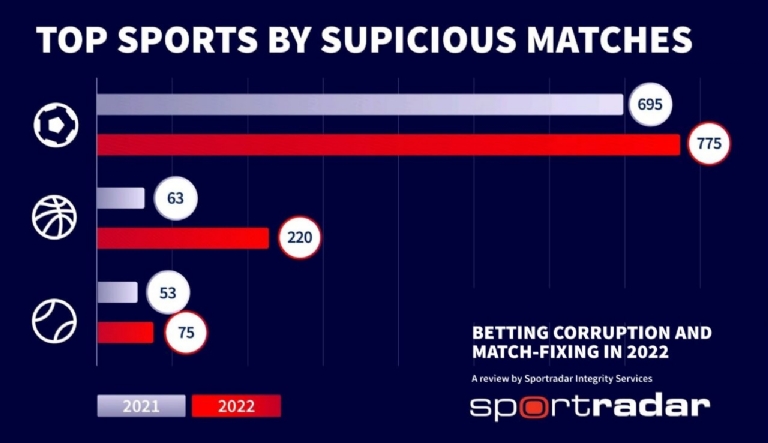

In addition to Brazil's leadership in the ranking of countries with the most suspicious games - not just football -, 2022 set a new record for doubtful matches: 1,212. 34% increase compared to 2021.
Suspect game is anyone that exhibits “overwhelming” evidence of match-fixing or with credible indications of manipulation. Sportradar claims to have a “high limit” for this classification.
Despite this growth, 99.5% of sporting events are "free of match-fixing", according to the company. No sport had a rate greater than 1% of questionable occurrences.
Controversial matches were identified in 12 sports and in 92 countries, from all continents. Sportradar currently monitors 850,000 games from 70 sports around the world.
Brazil at the top of the global ranking
Brazil was the country that had the most suspicious games identified last year, with 152 episodes. This represents 12% of the global total. Russia comes in second with 92.
Nearly half (47%) of all matches likely to have been match-fixed took place in 10 countries. Football accounted for 71.5% of cases in these countries.
1. Brazil – 152
2. Russia – 92
3. Czech Republic – 56
4. Kazakhstan – 43
5. China – 41
6. Greece – 40
7. Argentina – 39
8. Philippines – 37
9. Poland – 36
10. Thailand – 35
Football: sport with more cases
In 2022 football was, once again, the sport with the highest number of suspicious games in the world: 775, or 63.9% of the total.
These games mostly take place in lower competitions. Last year, 52% of these football episodes took place in each country's third national division or below, such as regional leagues.
For every 171 monitored football matches, one was considered suspicious in 2022.
The average of doubtful matches in all sports rose. Last year it was one in 475, against one in 545 in 2021.

Basketball, for example, grew by approximately 250% of cases. The continent with the highest number in total is Europe (630). Next come Asia (240) and South America (225). Africa recorded the highest percentage increase at 82%.
Of a total of 1,212 suspected matches worldwide last year across all sports, 98% were in men's competitions.
Sports entities and legislators consider match-fixing as an “intentional arrangement, act or omission aimed at improperly altering the result, or the course of a sporting competition, to eliminate all or part of the unpredictability of said competition,” seeking any undue advantage for oneself or another person.
A total of 169 sports or criminal sanctions were applied in 2022 to suspects of cheating or disrespect for the law, in 21 different countries, from the services of Sportradar. In 2021 there were 72 sanctions.
“Our technology allows us to monitor more games at a deeper level, providing more detailed and accurate information to help our partners, customers and the wider sports industry in efforts to protect sporting events from corruption. We look forward to supporting even more sports federations and legal authorities in 2023,” said Andreas Krannich, Global Director of Sportradar Integrity Services.
Source: GE